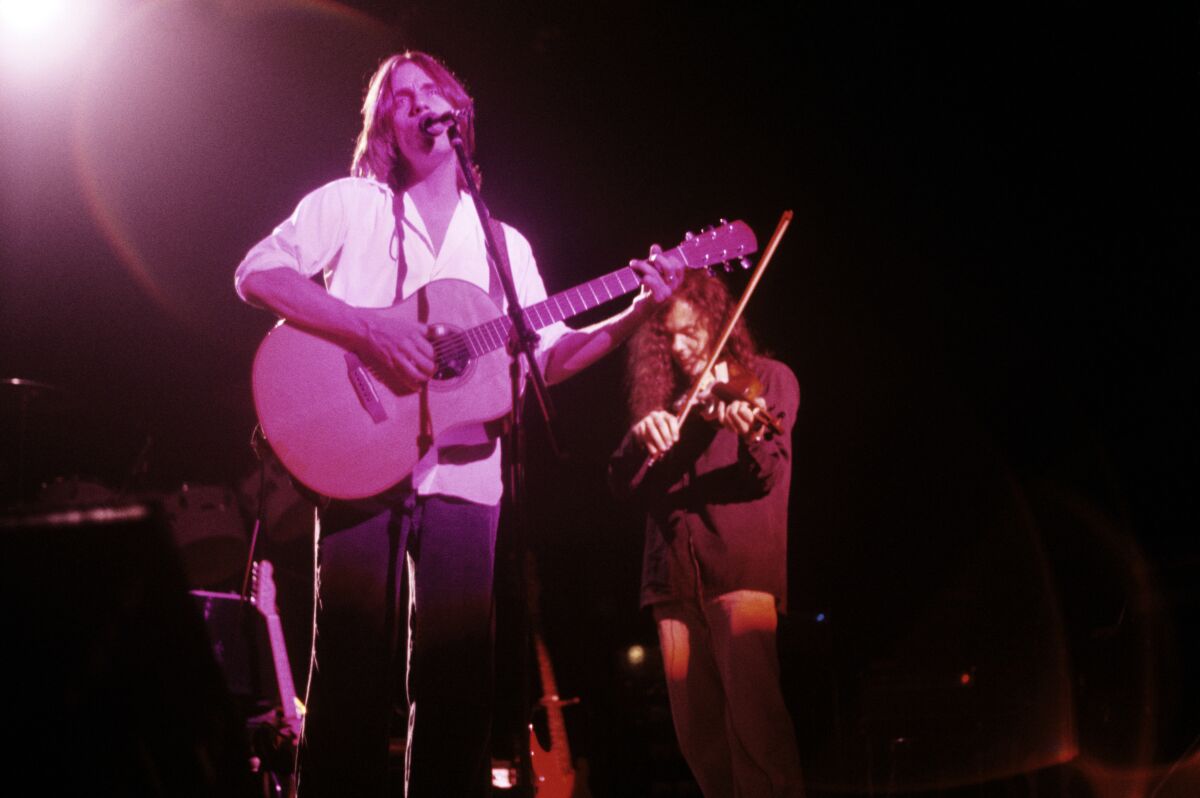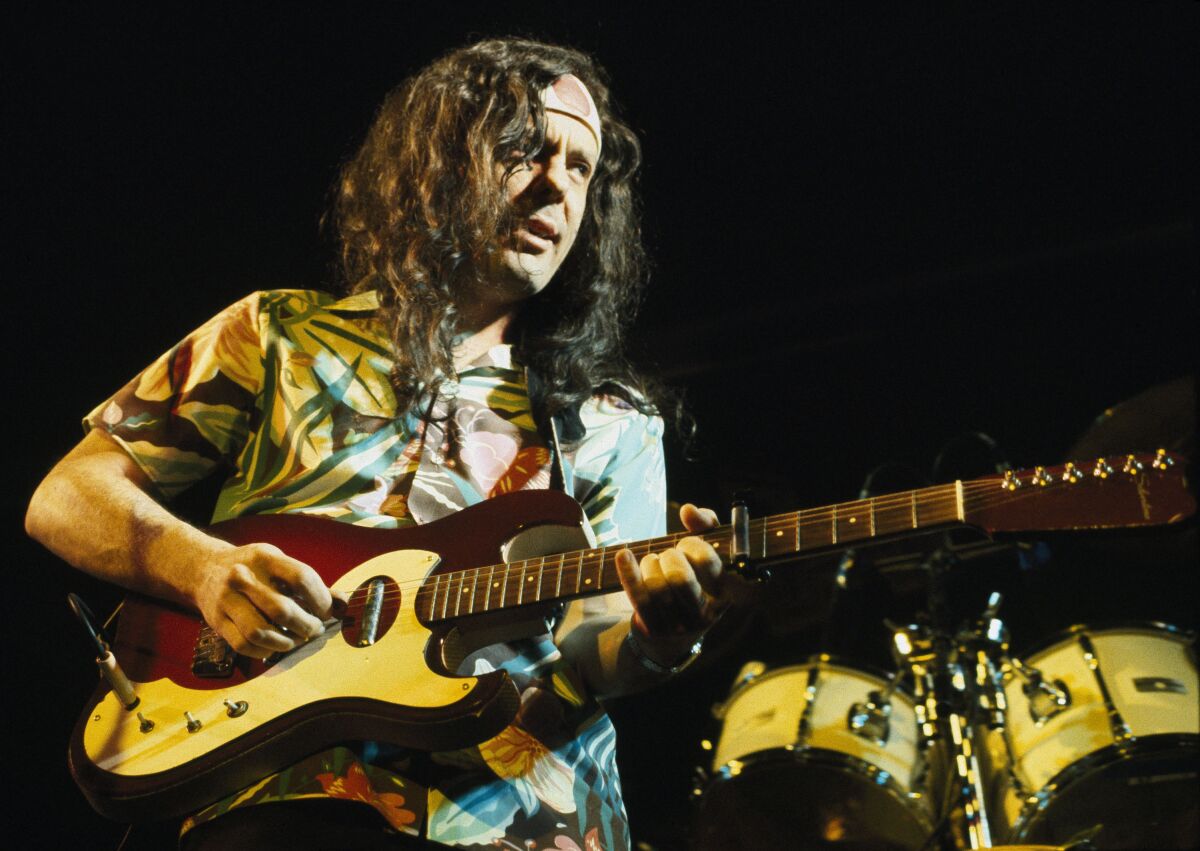David Lindley, guitarist with Jackson Browne, dies at 78
David Lindley, a multi-talented guitarist who was a fixture in Los Angeles recording studios during the 1970s and 1980s, died on Friday. He was 79.
A source close to Lindley confirmed his death to The Times.
After founding the psychedelic folk-rock group Kaleidoscope in 1966, Lindley supported many of the biggest stars of the era, establishing himself as a sought-after session musician through his work with Jackson Browne. After playing a prominent part on Browne’s “For Everyman” (1973) and “Late for the Sky” (1974), Lindley came to the forefront on 1977’s multi-platinum “Running on Empty,” playing an indelible lap steel solo on the album’s title track and sharing lead vocals on the hit cover version of Maurice Williams’ “Stay.” Lindley also played on Linda Ronstadt’s “Heart Like a Wheel” and Warren Zevon’s eponymous 1976 album, while also appearing on records by Crosby & Nash, Rod Stewart and Ry Cooder.
Americana singer-songwriter and guitarist Jason Isbell tweeted, “The loss of David Lindley is a huge one. Without his influence my music would sound completely different. I was genuinely obsessed with his playing from the first time I heard it. The man was a giant.”
On albums recorded with his band El Rayo-X in the early 1980s, Lindley displayed the full range of his musical interests, particularly in non-Western sounds. Lindley’s omnivorous tastes extended to the instruments he played. He accumulated all manner of stringed instruments from around the globe — he stated that he had “no idea” how many instruments he could actually play — often specializing in finding distinctive sounds in the kinds of cheap instruments other professional players would avoid.
David Lindley performs in 1983.
(Luciano Viti / Getty Images)
Born in San Marino, Calif. on March 21, 1944, Lindley grew up in a musical household, surrounded by his father’s eclectic collection of 78 rpm records. When he was a child, Lindley started playing banjo and fiddle, soon acquiring enough skill that he became a five-time winner of the annual Topanga Canyon Banjo Contest. While attending La Salle High School in Pasadena, he formed the folk group the Mad Mountain Ramblers, who started playing in Los Angeles folk clubs. There, he met Chris Darrow, forming the short-lived Dry City Scat Band before Lindley started dabbling in electric music. The pair reunited in Kaleidoscope, a psychedelic band that released their its first album, “Side Trips,” in 1967. That year, Lindley landed his first notable session work when he played a variety of instruments on Leonard Cohen’s debut album, “Songs of Leonard Cohen.”
Often drawing upon Middle Eastern musical concepts, Kaleidoscope lasted through four albums before splitting in 1970. Lindley headed to England, where he played with blues-rocker Terry Reid for a couple of years, appearing on Reid’s 1972 album “River.” After completing his stint with Reid, Lindley joined Browne’s band. Soon, he became a trusted collaborator of the singer-songwriter, appearing on every album Browne released between 1973’s “For Everyman” and 1980’s “Hold Out.”
While he was a fixture in Browne’s band, Lindley played sessions with many of the biggest stars of the mid-1970s. Ronstadt hired him for a trio of albums — “Heart Like a Wheel,” “Prisoner in Disguise” and “Simple Dreams” — while Rod Stewart brought him in to play on “Atlantic Crossing” and “A Night on the Town.” While producing Warren Zevon’s first album for Asylum, Browne had Lindley play fiddle and slide guitar; Zevon would later hire Lindley again in the 1980s. Ry Cooder enlisted him for “Jazz” and “Bop Till You Drop” in the late 1970s, sparking a collaboration that continued for decades; the pair would occasionally tour as a duo, with one of these ventures captured on the 2019 release “Cooder/Lindley Family Live at the Vienna Opera House.”

Jackson Browne, on acoustic guitar, and David Lindley, on violin, perform in 1977.
(Ebet Roberts / Redferns via Getty Images)
Lindley put session work on the back burner in the early 1980s when he formed El Rayo-X, a group he characterized as “more or less a party band.” On their self-titled 1981 album and its 1982 sequel “Win This Record!,” Lindley played a lively, vaguely new wave-inspired brand of roots-rock that found space for reggae rhythms along with an impish sense of humor; he rewrote the Huey Piano Smith hit “Rockin’ Pneumonia and the Boogie Woogie Blues” as “Tu-Ber-Cu-Lucas and the Sinus Blues” and penned an ode to condoms with “Ram a Lamb a Man.”
After “Very Greasy,” a Ronstadt-produced album from 1988, Lindley lost interest in mainstream rock along with his major label contract. While he would still appear on prominent albums like Bob Dylan’s “Under the Red Sky,” Iggy Pop’s “Brick by Brick” and John Prine’s “The Missing Years,” he pursued more esoteric interests on his own.
Starting with 1991’s “A World Out of Time,” he and avant-garde guitarist Henry Kaiser released a series of albums based on field recording expeditions held in Madagascar and Norway. Around this time, Lindley struck up a partnership with Hani Naser, recording a series of albums with the Jordanian oud player. He also developed an enduring relationship with reggae percussionist Wally Ingram.
Over the next few decades, Lindley happily resided on the fringes of mainstream music, but would occasionally re-enter the spotlight. He reunited with Browne for a tour of Spain in 2006; the concerts provided the source material for the live album “Love Is Strange.” That same year, Ben Harper had him play guitar on “Both Sides of the Gun.” Lindley released his last solo album, “Big Twang,” in 2007, a year in which he also scored the Werner Herzog documentary “Encounters at the End of the World” with Kaiser.
Lindley was a longtime resident of Claremont, Calif. He is is survived by his wife Joan Darrow — sister of his Kaleidoscope bandmate Chris Darrow — and their daughter Rosanne Lindley.
David Lindley, a multi-talented guitarist who was a fixture in Los Angeles recording studios during the 1970s and 1980s, died on Friday. He was 79.
A source close to Lindley confirmed his death to The Times.
After founding the psychedelic folk-rock group Kaleidoscope in 1966, Lindley supported many of the biggest stars of the era, establishing himself as a sought-after session musician through his work with Jackson Browne. After playing a prominent part on Browne’s “For Everyman” (1973) and “Late for the Sky” (1974), Lindley came to the forefront on 1977’s multi-platinum “Running on Empty,” playing an indelible lap steel solo on the album’s title track and sharing lead vocals on the hit cover version of Maurice Williams’ “Stay.” Lindley also played on Linda Ronstadt’s “Heart Like a Wheel” and Warren Zevon’s eponymous 1976 album, while also appearing on records by Crosby & Nash, Rod Stewart and Ry Cooder.
Americana singer-songwriter and guitarist Jason Isbell tweeted, “The loss of David Lindley is a huge one. Without his influence my music would sound completely different. I was genuinely obsessed with his playing from the first time I heard it. The man was a giant.”
On albums recorded with his band El Rayo-X in the early 1980s, Lindley displayed the full range of his musical interests, particularly in non-Western sounds. Lindley’s omnivorous tastes extended to the instruments he played. He accumulated all manner of stringed instruments from around the globe — he stated that he had “no idea” how many instruments he could actually play — often specializing in finding distinctive sounds in the kinds of cheap instruments other professional players would avoid.

David Lindley performs in 1983.
(Luciano Viti / Getty Images)
Born in San Marino, Calif. on March 21, 1944, Lindley grew up in a musical household, surrounded by his father’s eclectic collection of 78 rpm records. When he was a child, Lindley started playing banjo and fiddle, soon acquiring enough skill that he became a five-time winner of the annual Topanga Canyon Banjo Contest. While attending La Salle High School in Pasadena, he formed the folk group the Mad Mountain Ramblers, who started playing in Los Angeles folk clubs. There, he met Chris Darrow, forming the short-lived Dry City Scat Band before Lindley started dabbling in electric music. The pair reunited in Kaleidoscope, a psychedelic band that released their its first album, “Side Trips,” in 1967. That year, Lindley landed his first notable session work when he played a variety of instruments on Leonard Cohen’s debut album, “Songs of Leonard Cohen.”
Often drawing upon Middle Eastern musical concepts, Kaleidoscope lasted through four albums before splitting in 1970. Lindley headed to England, where he played with blues-rocker Terry Reid for a couple of years, appearing on Reid’s 1972 album “River.” After completing his stint with Reid, Lindley joined Browne’s band. Soon, he became a trusted collaborator of the singer-songwriter, appearing on every album Browne released between 1973’s “For Everyman” and 1980’s “Hold Out.”
While he was a fixture in Browne’s band, Lindley played sessions with many of the biggest stars of the mid-1970s. Ronstadt hired him for a trio of albums — “Heart Like a Wheel,” “Prisoner in Disguise” and “Simple Dreams” — while Rod Stewart brought him in to play on “Atlantic Crossing” and “A Night on the Town.” While producing Warren Zevon’s first album for Asylum, Browne had Lindley play fiddle and slide guitar; Zevon would later hire Lindley again in the 1980s. Ry Cooder enlisted him for “Jazz” and “Bop Till You Drop” in the late 1970s, sparking a collaboration that continued for decades; the pair would occasionally tour as a duo, with one of these ventures captured on the 2019 release “Cooder/Lindley Family Live at the Vienna Opera House.”

Jackson Browne, on acoustic guitar, and David Lindley, on violin, perform in 1977.
(Ebet Roberts / Redferns via Getty Images)
Lindley put session work on the back burner in the early 1980s when he formed El Rayo-X, a group he characterized as “more or less a party band.” On their self-titled 1981 album and its 1982 sequel “Win This Record!,” Lindley played a lively, vaguely new wave-inspired brand of roots-rock that found space for reggae rhythms along with an impish sense of humor; he rewrote the Huey Piano Smith hit “Rockin’ Pneumonia and the Boogie Woogie Blues” as “Tu-Ber-Cu-Lucas and the Sinus Blues” and penned an ode to condoms with “Ram a Lamb a Man.”
After “Very Greasy,” a Ronstadt-produced album from 1988, Lindley lost interest in mainstream rock along with his major label contract. While he would still appear on prominent albums like Bob Dylan’s “Under the Red Sky,” Iggy Pop’s “Brick by Brick” and John Prine’s “The Missing Years,” he pursued more esoteric interests on his own.
Starting with 1991’s “A World Out of Time,” he and avant-garde guitarist Henry Kaiser released a series of albums based on field recording expeditions held in Madagascar and Norway. Around this time, Lindley struck up a partnership with Hani Naser, recording a series of albums with the Jordanian oud player. He also developed an enduring relationship with reggae percussionist Wally Ingram.
Over the next few decades, Lindley happily resided on the fringes of mainstream music, but would occasionally re-enter the spotlight. He reunited with Browne for a tour of Spain in 2006; the concerts provided the source material for the live album “Love Is Strange.” That same year, Ben Harper had him play guitar on “Both Sides of the Gun.” Lindley released his last solo album, “Big Twang,” in 2007, a year in which he also scored the Werner Herzog documentary “Encounters at the End of the World” with Kaiser.
Lindley was a longtime resident of Claremont, Calif. He is is survived by his wife Joan Darrow — sister of his Kaleidoscope bandmate Chris Darrow — and their daughter Rosanne Lindley.
